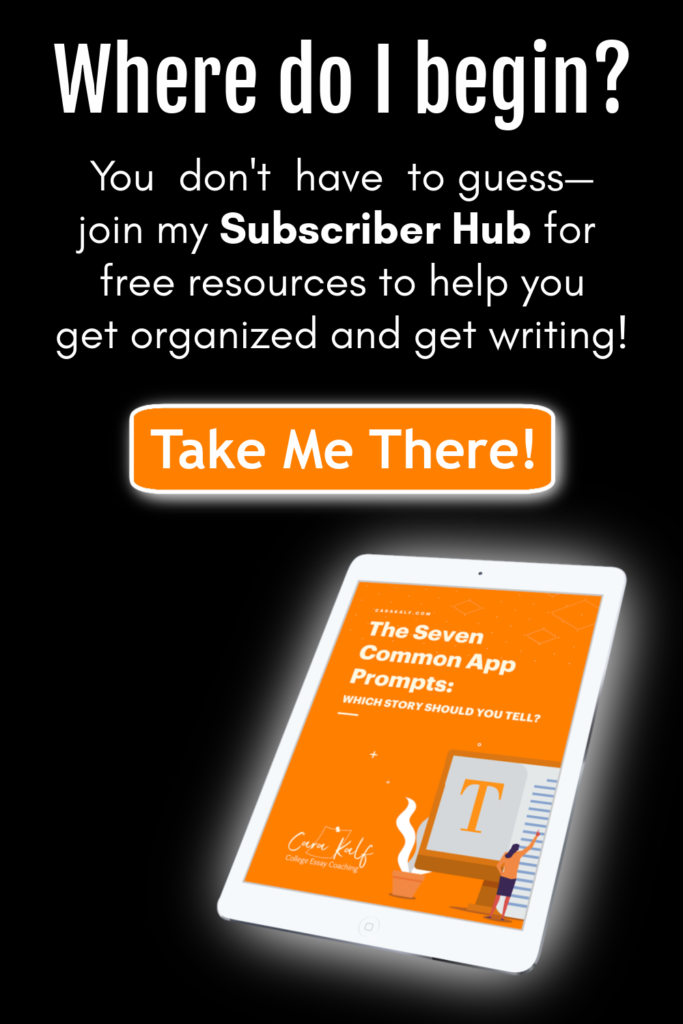“Curated Imperfection” and the College Essay
The goal of the college essay is always the same. No matter whose essay it is or what story it’s telling, the ‘moral’ at the end will be “I learned, I grew, I changed.” That’s it. That’s all there is to it!
The problem is, in order to demonstrate growth, you have to show a Before, as well as an After. And that’s where writers can grow a bit anxious—because to show a Before means to expose your less-than-perfect side to strangers. Take a page here from social media “influencers.” Sharing their lives with strangers is their specialty.
When an influencer shares a “behind-the-scenes” photo, she or he still knows you’re watching, making it … not really behind the scenes. Writer Laura Turner coined the term “curated imperfection” to describe the carefully out-of-place hair and “messy” room photos that these stars put together to make themselves “more relatable.” When an influencer chooses to show you a “no-makeup picture,” you know she took a lot of care to make sure the clothes, hair, and lighting were right, and certainly took several photos before choosing the one to share.
In the same way, you want to be a little manipulative in your college essay—you want to use “curated imperfection” to make your essay believable: “Well, she told me X, so she’s being honest about herself.” Just like the influencer, you get to choose what X is. Please note: I am not suggesting that you lie about X—that you make up a smaller flaw because you don’t believe any of the ones you really have is shareable, or that you make up a flaw because you don’t believe you have any worth mentioning. I am simply pointing out that just as you could take a no-makeup shot in softer or more harsh lighting, you can choose which flaw you put out so that it looks like you’re being honest about yourself, without perhaps bringing out your very worst.
For example, I might tell you that I’ve been so busy, I didn’t even remember to give my cats lunch. That would be seen as humorous (to everyone except my cats). But if I forgot to give my children lunch, readers would not likely find that funny. (NB: My children start asking for lunch by 10 a.m. I promise I don’t forget.). So I might admit to procrastinating on finding a date to prom, but not procrastinating on a group project when my group-mates ended up angry with me because I cost the entire group a full letter grade.
How do you decide whether a story is a “good” failing to share? Start by considering honestly how common it is. More people are afraid of public speaking than dying, so that would be a relatable fear to acknowledge. Procrastination is rampant among adults as well as teens, so that’s another failing that wouldn’t shock a reader. Then make sure you find the middle ground between an extreme example of failing, and one that’s too trivial to mention. If your failing was being terribly impatient, use an example stronger than something that would make anyone impatient (DMV line?) but not, perhaps, your very worst moment (you screamed at your 5-year-old sister because she wouldn’t leave the park on time to get home for your favorite TV show). Consider to whom you would be comfortable admitting your failing. Imagine as your audience your parents, favorite teacher, or other adult with whom you have a good relationship. If you feel embarrassed—but not mortified—you’re probably on the right track.
Consider, also, the arc of the story. The worst failing should ideally be no later than sophomore year, to give you time to fully outgrow it. But the main event of your story—when you triumph at something precisely because you learned to overcome that particular failing—should ideally have happened in the last year. If I draw attention to my unwillingness to work on something at the beginning of the essay, when I find myself hard at work mid-essay, the reader is impressed with my growth.
Let’s take procrastination as an example. Perhaps you acknowledge that you wrote papers at the last minute because you were able to do a good job right through freshman year of high school. But in sophomore year, you found that your grades were starting to fall. You had never before had to consider your time management and writing process because writing papers came easily to you, but now you had to either accept lower grades or make a change. You took it to heart, looked for inspiration, and found new systems that got your work done early. By spring of junior year, when you had your SAT, an orchestra concert and a major research paper on the same weekend, your systems allowed you to finish the research paper early and not need to cram for the SAT on the night of the concert. If you hadn’t grown when you did, you never would have succeeded.
That particular example is cliché—because, of course, it’s entirely fictional. But if that’s the strongest growth example you have, you can work with it! A story like that relies on personality and voice to convey both your growth and how likeable you are. Remember, you can’t be an Instagram star if people don’t want to hang out with you.
(Photo by Joe Ciciarelli on Unsplash.)





